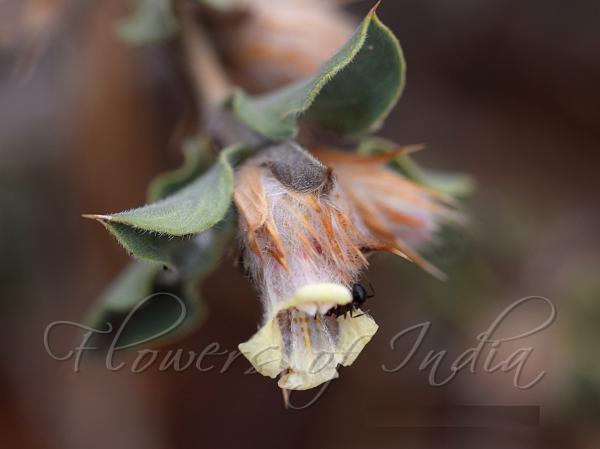|
| Yellowish Lepidagathis |
|

|

| File size | 381098 |
| Original date | 7/23/19 8:11 AM |
| Resolution | 2992 x 2000 |
| Flash | Flash did not fire, auto |
| Focal length | 90.0mm |
| Exposure time | 1/250s |
| Aperture | 8.0 |
| Focus Distance | |
| Metering Mode | Multi-segment |
| Camera make | NIKON CORPORATION |
| Camera model | NIKON D3300 |
| Sensor type | OneChipColorArea |
|
|
|
|
Photo: |
Botanical name: Lepidagathis gandhii Family: Acanthaceae (Acanthus family)
Yellowish Lepidagathis is a newly discovered (2023)
perennial undershrub, erect, up to 60 cm tall. It is named for Dr Kanchi
N. Gandhi, Senior Nomenclatural Registrar, Harvard University Herbaria,
Cambridge, US. Stems are well-branched, 4-angled, ash-colored when old,
green to purplish when young. Leaves are stalkless, isophyllous,
opposite-decussate, oblong to inverted-lanceshaped, 15-30 x 4-8 mm,
blunt or flat at base, wavy with minute retrorsely ciliolate margins,
pointed with spiny tip, lateral veins 3-5 pairs, prominent
on lower surface. Flowers are borne in a spike, compactly ovoid due to
prostrate converged fertile bracts, alternately arranged in the axils
of leaves with scale-like sterile bracts at the base, 8-15 mm long, up
to 9-flowered. Sepal-cup is 5-lobed, hetero-morphic, tapering with
spiny tip, silky on lower surface, hairless above. Anticous lobes 2,
fused at base (more than half of their total lengths, i.e., 4.2-6.3 mm
long), almost equal, overlapping; lobes oblong to narrowly elliptic,
8.5-10.4 x 2.3-3.3 mm; posticous lobe, lance-ovate, 8.5-11.2 x 1.5-3.4
mm; lateral lobes 2, equal, linear, 6.8-9.8 x 0.8-1.5 mm. Flowers are
two-lipped, 1.2-1.6 cm long, white (yellowish at maturity) with many
purplish-brown markings on expanded portion of tube inside and yellow
dots or patches on the palate; tube 8.8-10.5 mm long, cylindric below,
4.4-6 mm long, hairless inside, abruptly expanded above, 4.3-4.7 mm
long. Upper lip is arcuate, 1.8-3.6 x 4-4.7 mm, minutely 2-lobed at
tip, each lobe 3-veined; lower lip 3-lobed, 4.5-6.2 mm long including
lobes; middle lobe broader than the lateral lobes, nearly round,
2.7-2.9 x 2.5-4.5 mm, crenulate, 3-veined; lateral lobes 1.7-3.1 x
2.5-3.4 mm. Yellowish Lepidagathis is native to Tamil Nadu.
| Identification credit: S. Kasim | Photographed in Palladam, Tirupur Dist, Tamil Nadu. |
• Is this flower misidentified? If yes,